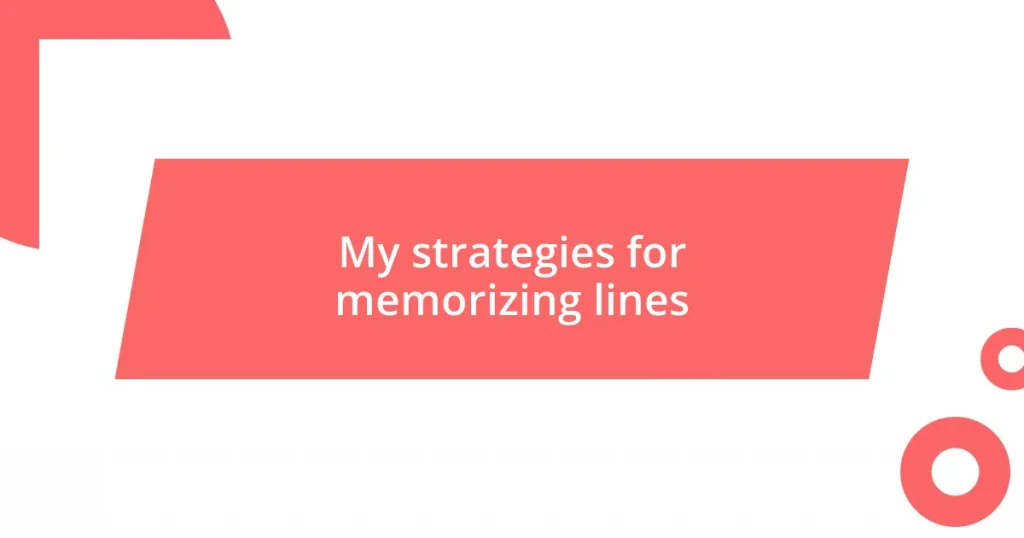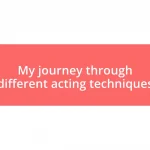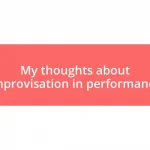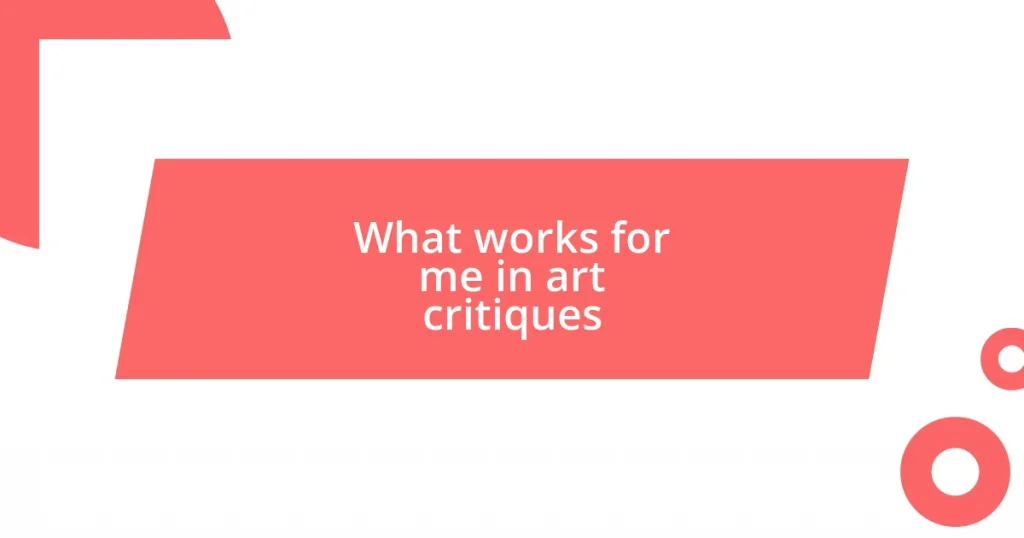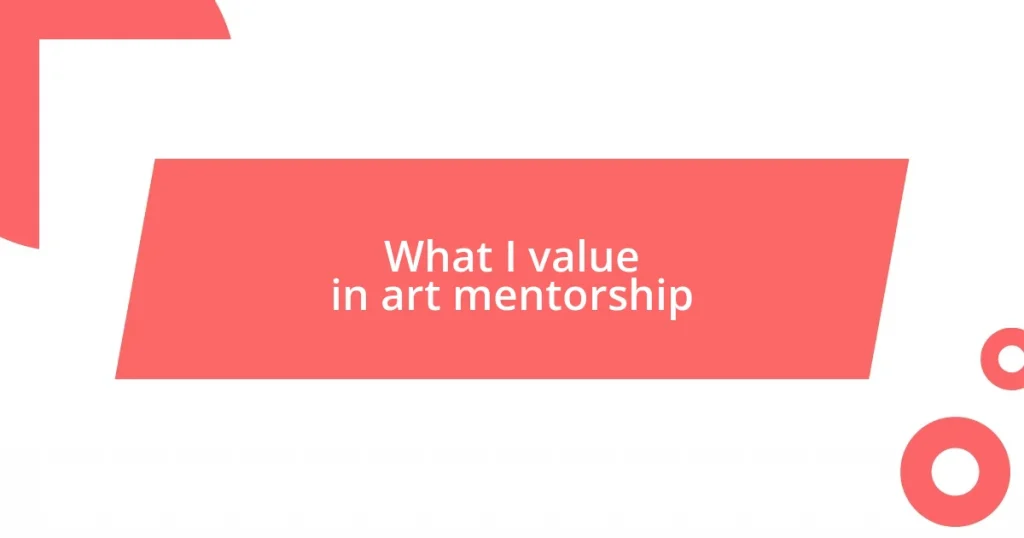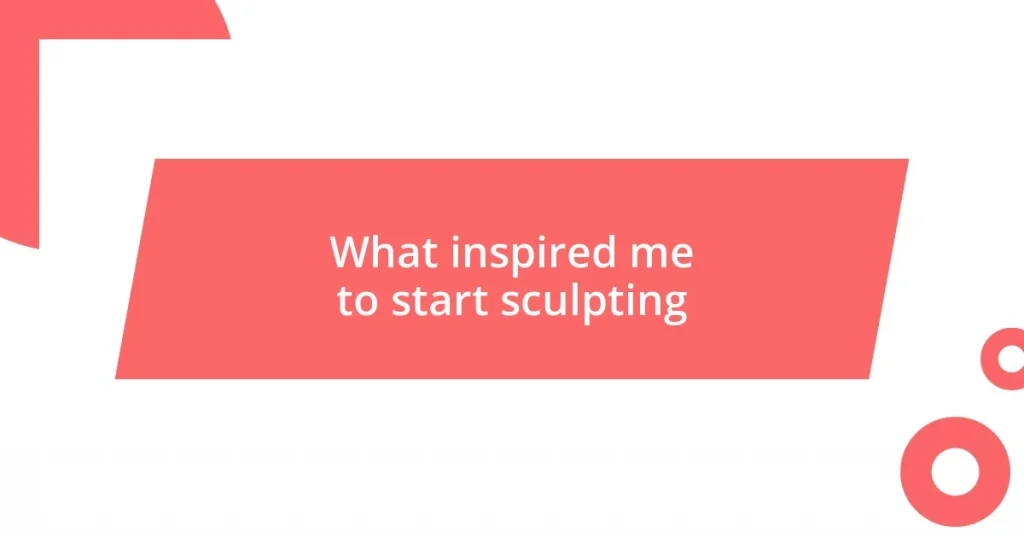Key takeaways:
- Utilizing visualization techniques, such as mind maps and scene imagery, enhances line memorization by linking emotions and visuals to the text.
- Breaking down scripts into manageable chunks and incorporating emotional connections significantly improves memorization by transforming it into a more meaningful experience.
- Technology, including mobile apps and video recording, supports memorization efforts by providing tools for practice, feedback, and tracking progress.
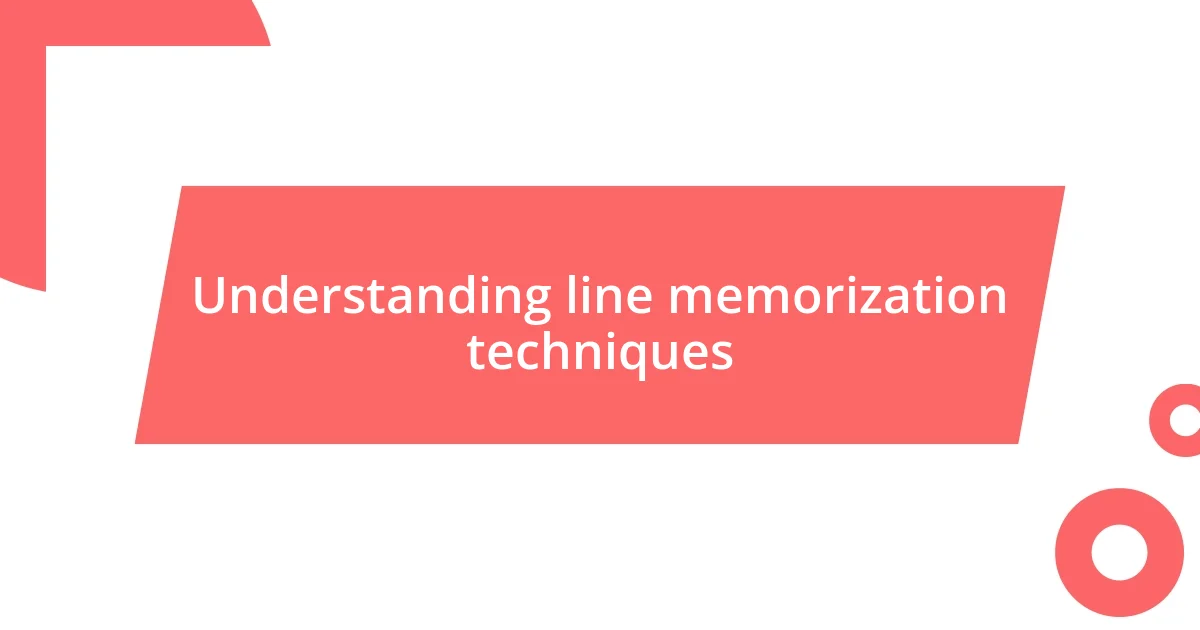
Understanding line memorization techniques
When it comes to memorizing lines, I often gravitate towards visualization techniques. I can still recall a pivotal rehearsal when I turned my script into a colorful mind map, mapping each scene with vivid images and emotions. Doesn’t it make sense that our brains are wired to remember pictures better than words?
Another effective method involves breaking down the script into manageable chunks. I remember feeling overwhelmed by long monologues until I started memorizing them in smaller segments. I’d take one sentence at a time, focusing on the underlying emotions and motives—this helped me grasp the character’s essence. Who hasn’t felt that little thrill when they realize a complex line is suddenly within reach?
Repetition is also a key player in line memorization. For me, saying the lines aloud while pacing around my room proved to be a game-changer. I think there’s something about the rhythm and motion that makes the words stick more easily. Have you ever tried teaching someone else your lines? That process not only reinforces your memory but also uncovers new layers of understanding in your performance.
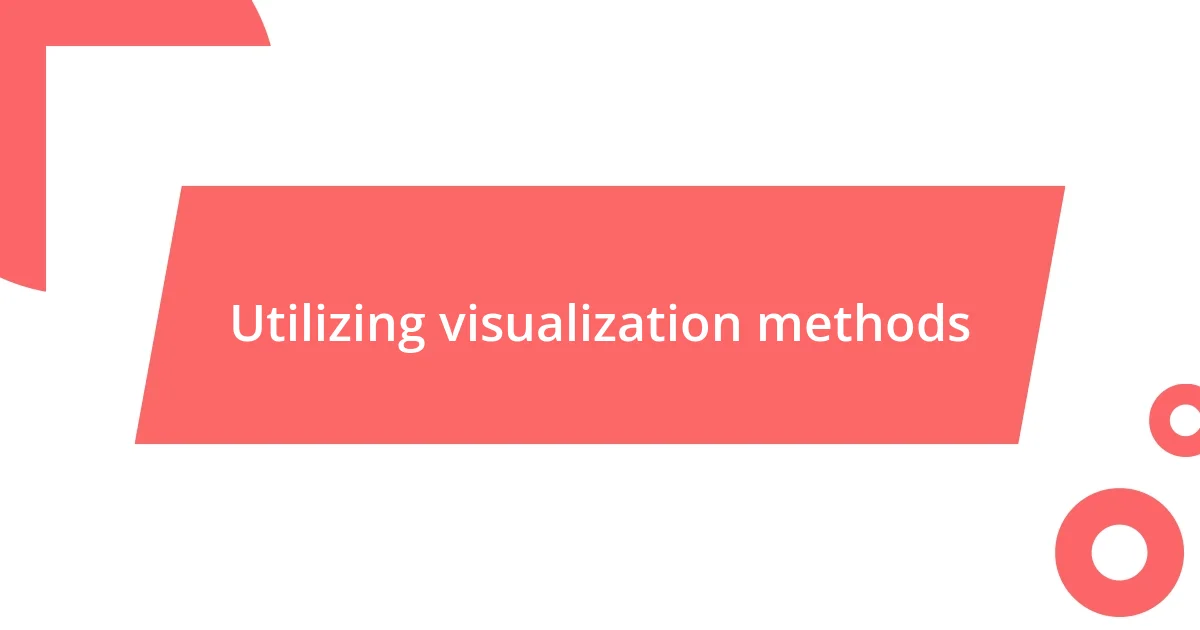
Utilizing visualization methods
Utilizing visualization methods can transform how you absorb your lines. I’ll never forget the time I imagined each line as the individual brushes of a painter crafting a grand mural on a canvas. Each brush stroke represented a key emotion or moment, anchoring the words in my mind. By doing this, I not only memorized the lines but also felt the rhythm of the scene flowing through me.
Here are some visualization techniques that have worked wonders for me:
- Mind maps: Create a colorful map representing each scene and emotional high point.
- Scene imagery: Picture the setting vividly, infusing it with sensory details like sounds and smells.
- Character visuals: Imagine your character in action, connecting them with specific gestures or facial expressions.
- Storyboarding: Sketch out scenes to visualize the progression of dialogue as part of a larger narrative.
These methods have enhanced my connection to the material, turning memorization into an immersive experience rather than a rote task. The visual cues significantly solidified my memory, making each performance feel more genuine and connected.
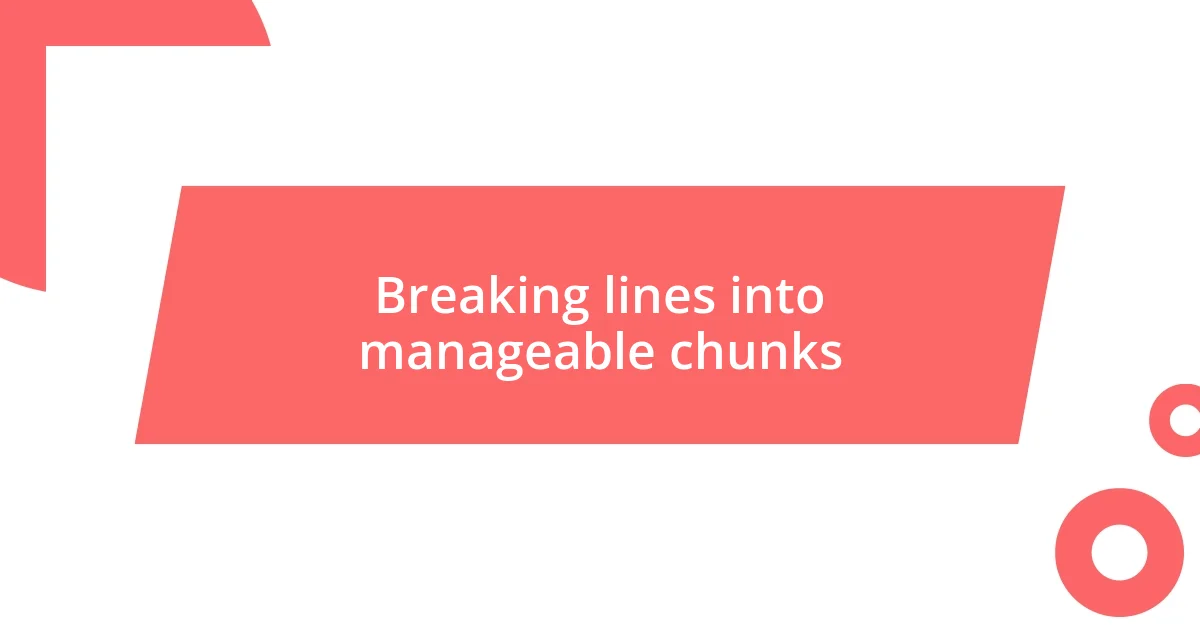
Breaking lines into manageable chunks
Breaking lines into manageable chunks has been crucial in my journey of memorization. I distinctly recall a time when I crammed a lengthy scene in just one go, feeling the pressure build as the words blurred together. By contrast, breaking it down into smaller, digestible parts made the memorization feel more achievable and less daunting. Each chunk became a little victory, allowing me to celebrate my progress in real-time.
I discovered that tapping into the emotional core of each segment is vital. For instance, when focusing on just a few lines that conveyed deep sadness, I would take a moment to connect with that emotion. It’s amazing how acknowledging the feelings behind the words turned memorization from a chore into a meaningful experience. It’s like piecing together a puzzle—once you see how it all fits, everything flows more naturally.
Let’s look at how different chunking methods can impact our memorization process. In my experience, the way we break down lines can create a profound difference in how we internalize them. Here’s a simple comparison to illustrate various approaches:
| Chunking Methods | Description |
|---|---|
| Sentence by Sentence | Focus on memorizing one line at a time, ensuring full understanding before moving to the next. |
| Phrase Clusters | Group related phrases together to create a natural flow, enhancing memorization through context. |
| Emotional Beats | Break lines based on emotional shifts, allowing for deeper connection and more impactful delivery. |
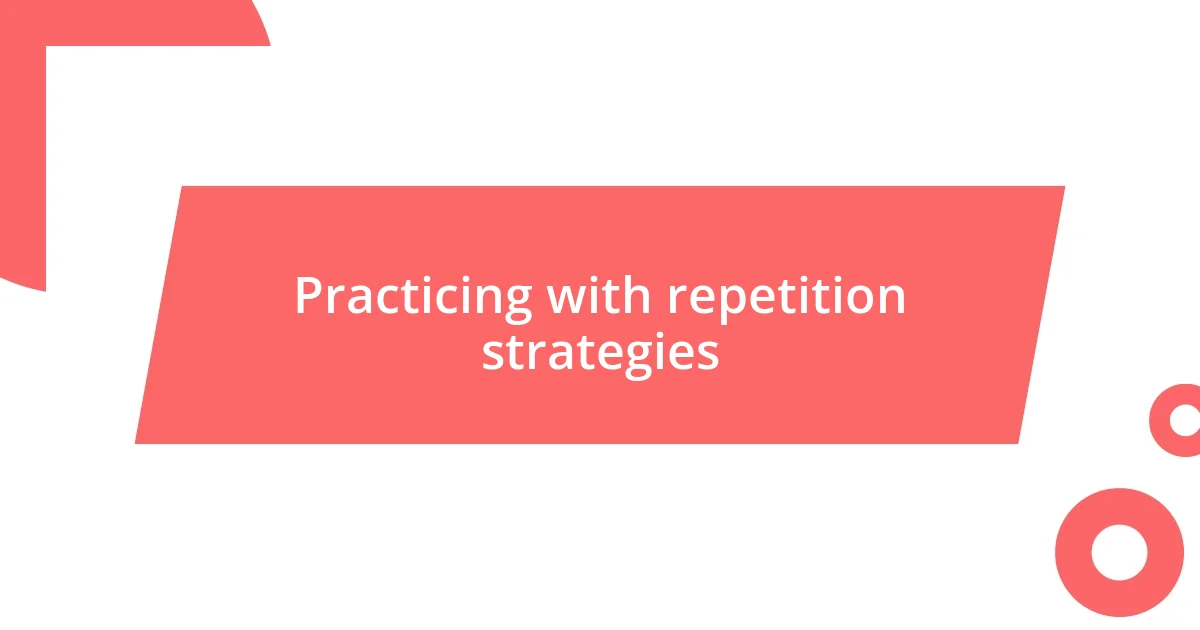
Practicing with repetition strategies
Repetition strategies have played a pivotal role in how I memorize lines effectively. I often find myself reciting my lines aloud, turning them into a kind of rhythm. It’s almost like singing; the melody sticks in my head long after I’ve practiced. Have you ever tried saying your lines while pacing? It’s remarkable how movement can reinforce memory, helping those words echo in my mind even when I’m on stage.
One approach I love is incorporating spaced repetition into my practice. This technique involves revisiting the lines at increasing intervals, which boosts long-term retention. I remember one particular week of rehearsals where I’d summarize a scene in the morning, review it again in the afternoon, and then repeat it just before bed. It felt less like labor and more like a game, revealing a fun rhythm in the learning process. Wouldn’t you agree that turning a potentially dull task into something enjoyable makes a world of difference?
Also, I’ve discovered that recording myself and listening back is incredibly effective. I’ve used this strategy countless times. I would record my lines while injecting various emotions, listening to them during commutes or while cooking. The sense of hearing the words spoken back to me in different ways created a powerful connection, making it easier to recall them when it mattered. This technique could easily transform your memorization routine, don’t you think?
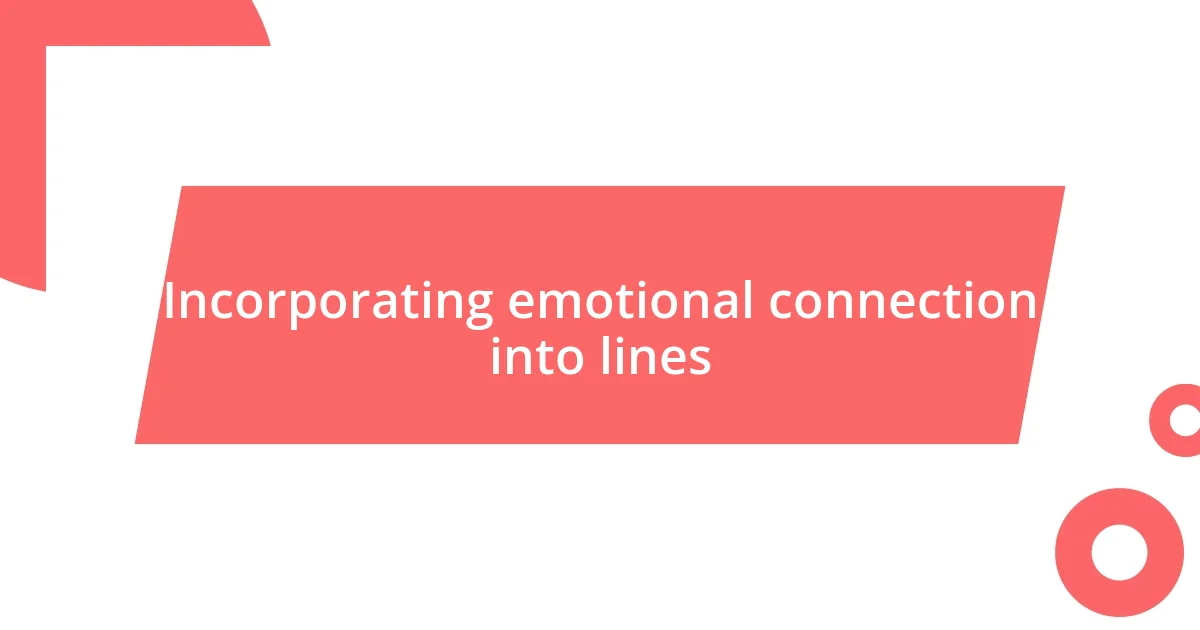
Incorporating emotional connection into lines
When I immerse myself in the emotional context of my lines, the words come alive. I remember rehearsing a monologue that dealt with loss—it hit me hard, and I found myself recalling a time when I experienced something similar. Connecting that personal emotion to the lines not only made memorization easier but infused my performance with authenticity. Isn’t it fascinating how our personal experiences can enhance our understanding of a character’s journey?
Engaging with the emotions behind the text allows for a deeper connection. I often ask myself, “What would I feel if I were in this situation?” This simple question transforms the memorization process into a much more engaging one. I recall a scene where my character experienced a burst of joy; visualizing a moment in my life that sparked true happiness made my lines stick. It’s incredible how drawing on our own feelings can bridge the gap between the script and our personal narrative.
Sometimes, I take a moment to visualize the audience while rehearsing. I imagine them feeling the same emotions I’m trying to convey. It’s a powerful practice that reshapes my approach to memorization. When I can envision sharing that emotional journey with others, those lines become part of a larger conversation. How do you think connecting with an audience can elevate your memorization experience? To me, it’s all about transforming the lines into a shared experience, making them unforgettable.
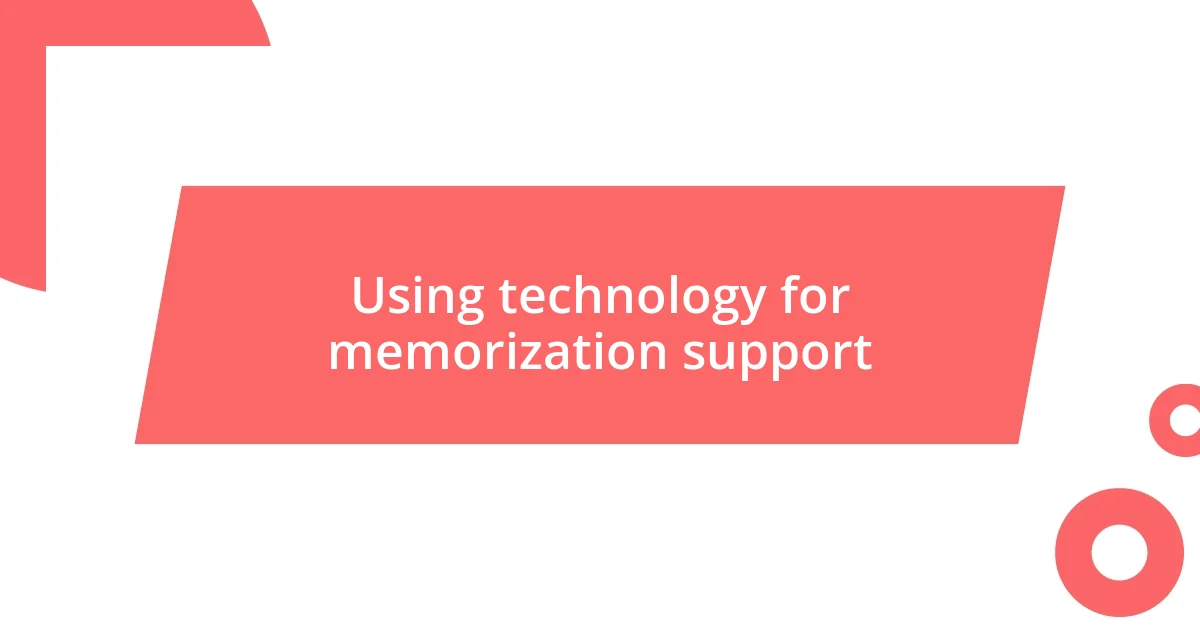
Using technology for memorization support
Using technology for memorization support can truly enhance the traditional methods I’ve employed over the years. For instance, I discovered mobile apps designed for line learning that allow you to record lines and review them at your own pace. The first time I tried one of these apps, I was surprised at how effective it was when I could adjust the playback speed or set reminders to review certain lines during my day. Have you ever used an app to aid your memorization? It can feel like having a personal coach right in your pocket!
I also find that online forums and social media groups dedicated to acting often share tips and tools that can help with memorization. A few weeks ago, I stumbled upon a thread where users were discussing their favorite websites for interactive quizzes that test your recalls, like typing out your lines from memory. I jumped on this bandwagon and started creating my own quizzes, which not only made my practice more fun but also highlighted areas where I needed more focus. Isn’t it interesting how a sense of community can motivate us to enhance our skills in unexpected ways?
Another powerful tech tool is video recording. I’ve started capturing my rehearsals and then analyzing them later. Watching myself helps me identify not just memorization gaps but also gestures and facial expressions that can complement the lines. The last time I did this, I noticed that I had forgotten a line but was able to see how I instinctively filled it with a related thought, which was exciting! I often ask myself, “How can technology transform our approach to performance?” Reality is, it provides a unique lens through which we can improve not just our memorization but our entire delivery.
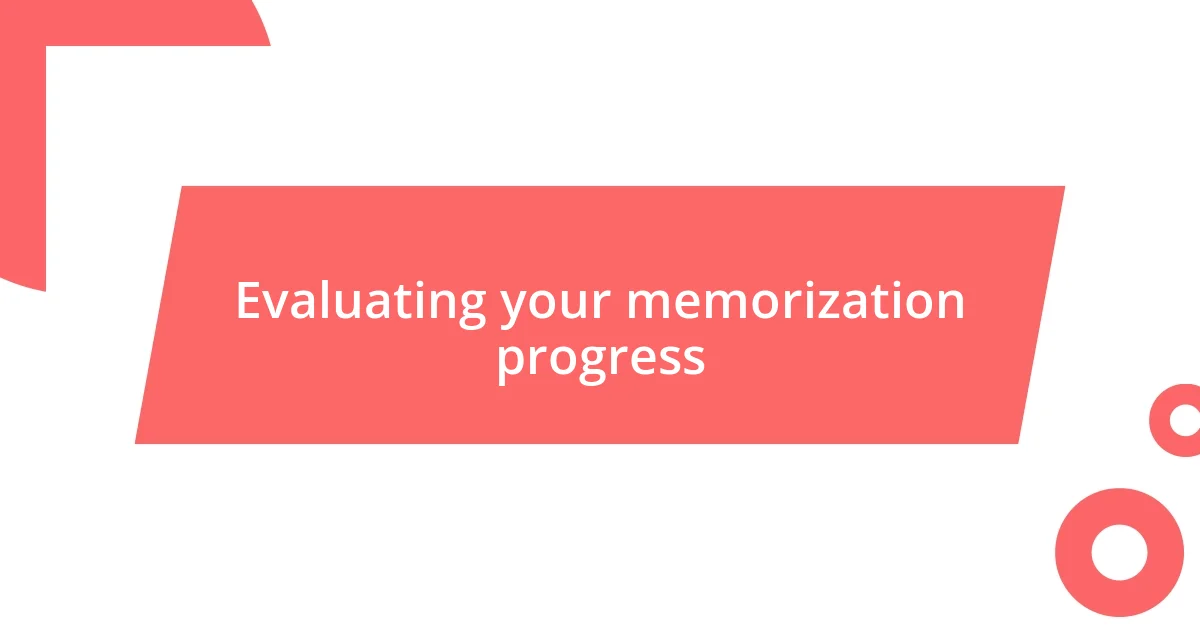
Evaluating your memorization progress
Tracking my memorization progress is a crucial part of my learning strategy. I like to keep a journal where I jot down which lines I’m confident with and which ones still trip me up. There was a time when I wrote about my experience struggling with a particularly lengthy monologue. After a few days of consistent review, the joy of finally nailing it was incredibly rewarding! Have you ever celebrated small victories like that in your own memorization journey?
Another method I employ is to perform my lines in front of a friend. Their feedback becomes an invaluable barometer of how well I’m retaining the material. I distinctly remember one rehearsal where my friend pointed out that I stumbled over a specific cue. This moment not only helped me feel more accountable but also turned the review process into a collaborative effort. Comparing notes with someone else can highlight blind spots that we might overlook on our own.
Additionally, I find it enlightening to compare my performance over time. I sometimes record my rehearsals and listen back to previous attempts. It’s fascinating to hear how my delivery evolves, and often, I’m pleasantly surprised by my progress. For example, during one review session, I noticed I had improved my emotional range significantly, which made me realize that my memorization was intrinsically connected to my growing confidence. Isn’t it fascinating how progress in memorization can reflect our broader development as performers?










